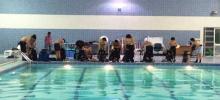A study issued by King Khalid University recommends the training of Teaching Faculty members in measurement field

A recent study issued by King Khalid University (KKU), which was conducted by the Participant Professor of Education Principles, who is also an adviser at the Deanship of Academic Development and Quality in the University, Dr. Ghada Hamza Al-Sherbini, has revealed the importance of training the teaching faculty members in the measurement field, and in the evaluation of educational outcomes, to make them better aware of the aim of evaluation, which is the improvement, not the evaluation of student performance.
The study discussed the current practice for the measurement of learning outcomes of the academic programs in the university -"King Khalid University as a sample" - which relied on descriptive and analytical approach, and used questionnaire tool. The study sample included a random sample of the faculty members in the University; 26 members from scientific disciplines, and 27 members from literary disciplines.
The aim of the study was to try to identify to what extent the faculty members at King Khalid University could perform their roles in measurement evaluation of the educational outcomes for academic programs. The questionnaire used in the study consisted of 33 paragraphs distributed in four axes, namely 'Planning: 10 paragraphs', 'implementation: 12 paragraphs', 'the revision: 5 paragraphs', and the 'corrective actions: 6 paragraphs'.
The study results disclosed that the study samples are planning to measure, and to evaluate the learning outcomes at the level of their courses, and at the level of the academic program. They do their roles in the implementation stage to measure and to evaluate the learning outcomes, although there are some practices that are not fully performed, like not depending on e-file system in evaluation, as well as the scarcity in the usage of note cards in the evaluation of the students’ performance.
The study results also showed a clear deficiency in the completion of the study sample for the third and fourth phases of the measurement and evaluation process, which are the review and the corrective actions stages.
The study recommended the spreading of the culture of measurement and evaluation of learning outcomes, the identification of its methods and tools, as well as its various stages, and the educating of the faculty members about its purpose, which is not to evaluate the student performance, but to improve it.
The study also recommended for the training of the faculty members in the field of measurement and evaluation of learning outcomes, and on how to complete all measurement phases and evaluation, as well as training them on how to do the statistical processing of the results of the measurement and evaluation processes. Other areas recommended include training the faculty members on how to achieve consistency between the message of learning outcomes, content, activities, evaluation strategies and the evaluation methods in programs and in the courses.
In addition to complete the arrays program model to examine the gap between the learning outcomes courses and the learning outcomes program, and to make them aware of the necessity of reviewing the consistency between the university message, the college message, the message and the goals, and the learning outcomes of the academic program, rebuilding and developing the academic programs according to the measurement results and the evaluation of learning outcomes, and the development of learning outcomes of academic programs and improving the academic program and developing it, to become closer to the students’ needs, and contribute in the development of their skills and abilities.
The study also recommended the diversification in the measurement of learning outcomes methods, to include the measurement of the required skills for the job market, the adoption of programs and courses designed with high quality to achieve the desired educational quality level, and the reliance on tests system based on a high level of credibility and cooperation with employment bodies in order to ensure the provision of educational services at the appropriate quality standard.









